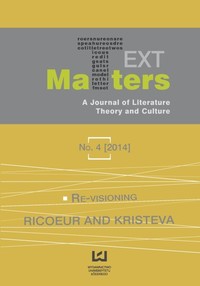Reading The Road with Paul Ricoeur and Julia Kristeva: The Human Body as a Sacred Connection
DOI:
https://doi.org/10.2478/texmat-2014-0007Abstract
Cormac McCarthy’s novel The Road confronts readers with a question: what is there to live towards after apocalypse? McCarthy locates his protagonists in the aftermath of the world’s fiery destruction, dramatizing a relationship between a father and a son, who are, as McCarthy puts it, “carrying the fire.” This essay asserts that the body carrying the fire is a sacred, incandescent body that connects to and with the world and the other, unifying the human and the divine. This essay will consider the body as a sacred connection in The Road. Paul Ricoeur’s hermeneutics and Julia Kristeva’s psychoanalytic approach will help to explore what is sacred. In addition, their works elucidate the body as a present site of human connection and sacredness while calling attention to what is glaringly absent yet hauntingly present in McCarthy’s text: the mother. In the aftermath of destruction, primitive, sacred connections become available through the sensual body, highlighting what is at stake in the novel: the connection of body and spirit. The essay will attempt to show that McCarthy’s rejection of a redemptive framework, or hope in an otherworldly reality, shrouds spirit in physicality symbolized by the fire carried by the body. This spirit offers another kind of hope, one based on the body’s potential to feel and connect to the other. The thought and works of Ricoeur and Kristeva will broaden a reading of McCarthy’s novel, especially as a statement about the unification of body and spirit, contributing a multidimensional view of a contemporary problem regarding what sustains life after a cataclysmic event.
Downloads
References
Boehme, Jacob. The Six Theosophic Points. Trans. John Rolleston Earle. 1620. Whitefish: Kessinger Legacy Reprints, 1992. Print.
Google Scholar
Clément, Catherine, and Julia Kristeva. The Feminine and the Sacred. Trans. Jane Marie Todd. New York: Columbia UP, 2001. Print.
Google Scholar
Cox Miller, Patricia. “Visceral Seeing: The Holy Body in Late Ancient Christianity.” The Journal of Early Christian Studies 12 (2004): 391-411. Print.
Google Scholar
Eliade, Mircea. The Sacred and the Profane: The Nature of Religion. Trans. Willard R. Trask. Orlando: Harcourt, 1959. Print.
Google Scholar
Freud, Sigmund. The Interpretations of Dreams. Trans. A. A. Brill. New York: Macmillan, 1913. Print.
Google Scholar
Heraclitus of Ephesus. Fragments. Trans. T. M. Robinson. Toronto: U of Toronto P, 1987. Print.
Google Scholar
The Jewish Study Bible. Ed. Adele Berlin and Marc Zvi Brettler. Oxford: Oxford UP, 2004. Print.
Google Scholar
Jung, Carl. Symbols of Transformation. Trans. R. F. C. Hull and Gerhard Adler. Princeton: Princeton UP, 1977. Print.
Google Scholar
Kristeva, Julia, Hatred and Forgiveness. Trans. Jeanine Herman. New York: Columbia UP, 2010. Print.
Google Scholar
Kristeva, Julia. “Joyful Revolt: A Conversation with Julia Kristeva.” Hope: New Philosophies for Change. By Mary Zournazi. New York: Routledge, 2001. 64-77. Print.
Google Scholar
Kristeva, Julia. New Maladies of the Soul. Trans. Ross Guberman. New York: Columbia UP, 1995. Print.
Google Scholar
Kristeva, Julia. Tales of Love. Trans. Leon S. Roudiez. New York: Columbia UP, 1987. Print.
Google Scholar
McCarthy, Cormac. The Road. New York: Vintage, 2006. Print.
Google Scholar
Merleau-Ponty, Maurice. Phenomenology of Perception. New York: Routledge, 2002. Print.
Google Scholar
Ricoeur, Paul. “Christianity and the Meaning of History, Progress, Ambiguity, and Hope.” The Journal of Religion 32 (1952): 242-53. Print.
Google Scholar
Ricoeur, Paul. “Fatherhood: From Phantasm to Symbol.” Trans. Robert Sweeney. Conflict of Interpretations. Ed. Don Ihde. Evanston: Northwestern UP, 1974. 468-97. Print.
Google Scholar
Ricoeur, Paul. Figuring the Sacred: Religion, Narrative, and Imagination. Trans. David Pellauer. Minneapolis: Fortress, 1995. Print.
Google Scholar
Ricoeur, Paul. The Rule of Metaphor. Trans. Robert Czerney. London: Routledge, 2003. Print.
Google Scholar
Ricoeur, Paul. Symbolism of Evil. Trans. Emerson Buchanan. Boston: Beacon, 1967. Print.
Google Scholar
Downloads
Published
How to Cite
Issue
Section
License

This work is licensed under a Creative Commons Attribution-NonCommercial-NoDerivatives 4.0 International License.













